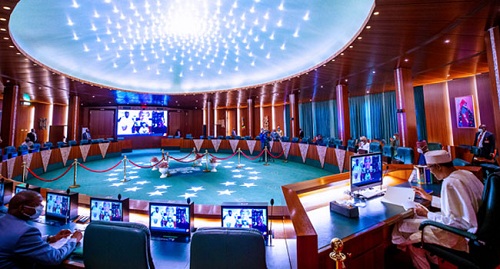This post has already been read 98978 times!
Governors of the 36 states will tomorrow, Wednesday 27th May 2020 gather to review a number of critical national questions that revolve around the financial autonomy for the judiciary and legislature of the state, code-named the Executive Order 10, 2020.
Nigeria Governors Forum (NGF) Head, Media and Public Affairs, Abdulrazaque Bello-Barkindo, who disclosed this in a statement in Abuja said the meeting, like eight others before it, have in attendance all the state governors via Microsoft Team from their various states.
Bello-Barkindo further disclosed that governors will also touch issues around the NLNG ownership, the controversial NCDC Bill, the restructuring of states loans and the FAAC deductions which have been a recurring decimal on the governor’s table.
“There will also be a general update on the efforts of the Coalition Against Covid19, CACOVID”
“The invitation which was issued by the Director-General of the Nigeria Governors’ Forum, Mr Asishana Bayo Okauru also disclosed that the meeting will discuss follow ups from the last NEC meeting.”
President Muhammadu Buhari, on Friday, signed into law an Executive Order to grant financial autonomy to the legislature and the judiciary across the 36 states of the country.
The order also mandates the accountant-general of the federation to deduct from source amount due to state legislatures and judiciaries from the monthly allocation to each state for states that refuse to grant such autonomy.
Lawyers, Civil Society Organisations (CSOs) had splitted over Buhari’s executive order.
Former Minister of Education, Professor Tunde Adeniran, and constitutional lawyer, Chief Mike Ozekhome, SAN, who spoke on the issue commended President Buhari on the move.
Adeniran said the development is part of the restructuring being clamoured for in the past few years.
The Professor of Political Science who doubles as factional national chairman of the Social Democratic Party, (SDP), said the executive order is in order.
“It is quite in order. It is one of the steps to bring sanity into governance and entrench the principle of separation of powers. It is a vital aspect of the vertical and horizontal restructuring of the country.”
On his part, Ozekhome argued that the executive order would help checkmate excesses of some state governors who often deep their hands in the allocations of states’ legislative and judicial arms.
Executive Director, Civil Society Legislative Advocacy Centre, (CISLAC), Auwal Ibrahim Rafsanjani, said: “We welcome the development of allowing the states’ legislature and judiciary to have autonomy because this is the only way to allow the three arms of government in our constitution-the executive, legislature and judiciary to function independently and transparently.
This is the only way we can restore confidence in our democracy because going by the current practice that governors have actually pocked or manipulated and directed the function of the legislature and judiciary, it is not giving hope for people to really have confidence in democracy and democratic governance in Nigeria.’’
Executive Director, YIAGA AFRICA, Samson Itodo, described the President’s Executive Order as a symbolic step in support of financial autonomy of state legislature and judiciary but could be disobeyed by the governors as they have succeeded in doing.
The President has accented to the Constitutional Amendment Bill as the first alteration to grant financial autonomy to the legislature and as well as the judiciary. When the President assented to that legislation there were no constitutional amendments other actions to further operationalise that particular amendment.
The President’s Executive Order is also a dangerous precedence because if it would take an executive order for governors to comply with the constitution, it is actually a threat to constitutional fidelity.
In another reaction, the Convener, Concerned Nigerians, Deji Adeyanju, condemned the action and said the President was attempting to amend the constitution with the Executive Order.
“The President giving an Executive Order granting financial autonomy to state legislature and judiciary as noble and commendable as it is, is unconstitutional. It contravenes the provisions of the constitution,’’ he said.
Convener, Coalition in Defence of Nigerian Democracy and Constitution, Ariyo-Dare Atoye, decried the action of the President, saying: “The decision of the President to use an Executive Order to appropriate what the constitution has already provided for is not only superfluous but also represents the display of a dangerous act that is capable of undermining the grand norm, and put democracy in jeopardy.
“As a matter of serious concern, the people should be wary and the National Assembly should thoroughly investigate this faux pas, as to whether it was done to deliberately override the constitution, or the Attorney General of the Federation (who advises the President on matters of law) has become grossly incompetent or legally impaired, and should because of this anomaly and many more in the past, tender his apology and resignation.”



